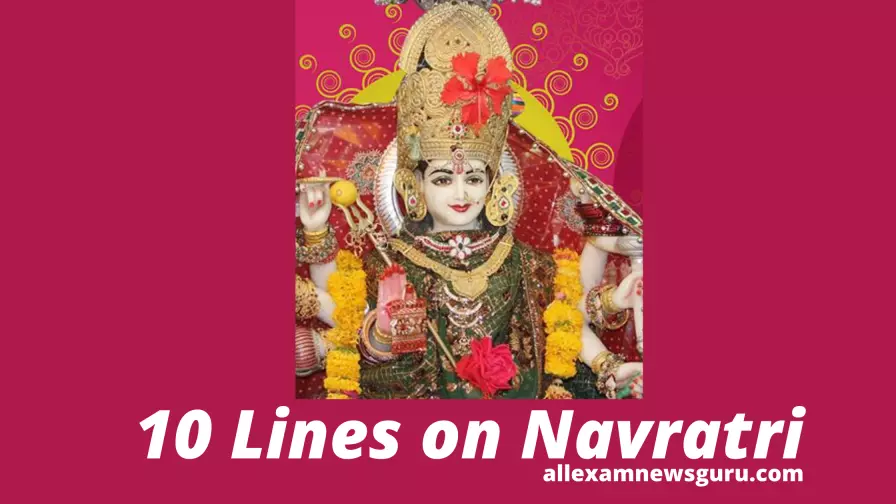If you are looking for an essay on Navratri or 10 lines on Navratri, then you are at the right post.
Navratri is a Hindu festival celebrated nine nights in honour of the Supreme Goddess Durga. It is a very important festival celebrated with great pomp and show in INDIA.
It is celebrated at the end of the nine days in the month of Ashwin (September or October) when the moon enters into the Shukla paksha (waxing phase).
10 lines on Navratri
- Navratri is a Hindu festival celebrated in the autumn every year.
- The word Navratri means nine nights in Sanskrit, Nava means nine, and Ratri meaning nights.
- During these nine nights and ten days, nine forms of Shakti/Devi have been worshipped: Durga, Kali, Katyayani, Kaalratri, Mahalakshmi, Mahasaraswati, Tara, Brahmani, and Siddhidatri.
- This is an important festival for Hindu followers all across the globe.
- Navratri is observed for different reasons and is celebrated differently in various parts of India.
- In most of the regions of India, Navaratri is a festival of lights.
- In India’s eastern and northeastern states, Navaratri is the time used to celebrate the advent of spring and the beginning of the harvest season.
- In the northern and western states, Navaratri is the time to give respect and offerings to the household and community gods and goddesses.
- Navratri marks the yearly celebration of the goddess Durga slaying the demon Mahishasura.
- The 10th day on Navrati is Dussehra, which is celebrated all over the country.
Short Essay on Navratri
Navratri is a festival of nine days of festivities and celebrations. The Navratri festival is one of the most significant Hindu festivals celebrated in India by Hindus in all parts of the world.
The festival, in reality, is a set of nine different festivals in which the Goddess is worshipped in nine different forms by different sects of Hindus.
The Navratri is observed for nine days. The first three days are called the Shukla Paksha or the bright fortnight.
On the first day, the ceremonies are performed for the Goddess, Durga.
On the second day, the ceremonies are performed for the Goddess, Lakshmi.
On the third day, the ceremonies are performed for the Goddess, Saraswati.
The next four days are called the Krishna Paksha or the dark fortnight.
On the fourth day, the ceremonies are performed for the Goddess, Kali.
On the fifth day, the ceremonies are performed for the Goddess, Gauri.
On the sixth day, the ceremonies are performed for the Goddess, Subhadra.
On the seventh day, the ceremonies are performed for the Goddess, Annapurna.
On the eighth day, the ceremonies are performed for the Goddess, Varahi.
On the ninth day, the ceremonies are performed for the Goddess, Bhadrakali.
- Essay on Sharks For Students & Children - April 8, 2024
- Essay on Cats for Students (+PDF) - November 4, 2023
- Essay on Carpenter|10 Lines on Carpenter - November 4, 2023

